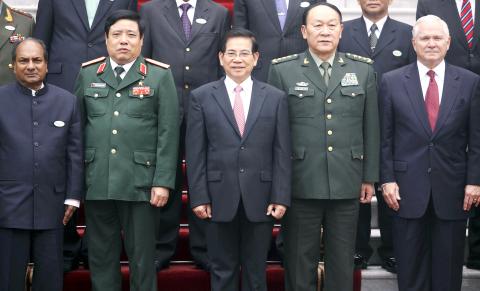AP, HANOI
China worked to calm nerves yesterday among Asian neighbors jittery over its recent attempts to assert greater control over disputed waters, while the US stressed its national interest in keeping those seas free for commerce.
US Secretary of Defense Robert Gates said the US has a stake in the growing number of disputes about ownership of Asian island chains and ship routes through waters China claims.

Photo: REUTERS
“We have a national interest in freedom of navigation, in unimpeded economic development and commerce and in respect for international law,” Gates told an ASEAN defense ministers’ forum in Hanoi.
The message was strong and the audience unmistakable, but Gates avoided a direct confrontation with China. He never mentioned the country by name during a brief address to the group, which included his Chinese counterpart, General Liang Guanglie (梁光烈).
Several Asian countries have expressed concern over increasingly aggressive maritime moves by Beijing, including its response to a ship collision last month off disputed islands — known as Senkaku in Japan and Diaoyutai (釣魚台) in Taiwan and China — that plunged relations between China and Japan to a five-year low.
China tried to ease tensions yesterday by reassuring its neighbors that it wants to work together.
“China pursues a defense policy that is defensive in nature. China’s defense development is not aimed to challenge or threaten anyone, but to ensure its security and promote international and regional peace and stability,” Liang said in his speech to the forum. “Security of a country relies not only on self-defense capabilities, but also on mutual trust with others.”
ASEAN defense ministers, along with their counterparts from the US, China, Russia, Japan, Australia, New Zealand, India and South Korea attended the meeting.
“The United States has always exercised our rights and supported the rights of others to transit through, and operate in, international waters,” Gates said. “This will not change, nor will our commitment to engage in activities and exercises together with our allies and partners.”
Meanwhile, a senior US defense official said in Hanoi yesterday that Beijing appears to be adopting a slightly more conciliatory tone over territorial disputes in the South China Sea, backing away from describing the area as part of its “core interests,” putting the issue on a par with Tibet or Taiwan.
“They now, at least in some of our interactions with them, appear to have backed away somewhat from the ‘core interest’ argument,” said the official, who spoke on condition of anonymity.
Chinese leaders seem “to be seeking to come up with other ways to articulate their approach to these issues,” the official told reporters. “It is probably fair to conclude that there is some internal debate in Beijing about exactly how they approach this set of issues.”

UKRAINE, NVIDIA: The US leader said the subject of Russia’s war had come up ‘very strongly,’ while Jenson Huang was hoping that the conversation was good Chinese President Xi Jinping (習近平) and US President Donald Trump had differing takes following their meeting in Busan, South Korea, yesterday. Xi said that the two sides should complete follow-up work as soon as possible to deliver tangible results that would provide “peace of mind” to China, the US and the rest of the world, while Trump hailed the “great success” of the talks. The two discussed trade, including a deal to reduce tariffs slapped on China for its role in the fentanyl trade, as well as cooperation in ending the war in Ukraine, among other issues, but they did not mention

Japanese Prime Minister Sanae Takaichi yesterday lavished US President Donald Trump with praise and vows of a “golden age” of ties on his visit to Tokyo, before inking a deal with Washington aimed at securing critical minerals. Takaichi — Japan’s first female prime minister — pulled out all the stops for Trump in her opening test on the international stage and even announced that she would nominate him for a Nobel Peace Prize, the White House said. Trump has become increasingly focused on the Nobel since his return to power in January and claims to have ended several conflicts around the world,

REASSURANCE: The US said Taiwan’s interests would not be harmed during the talk and that it remains steadfast in its support for the nation, the foreign minister said US President Donald Trump on Friday said he would bring up Taiwan with Chinese President Xi Jinping (習近平) during a meeting on the sidelines of the APEC Summit in South Korea this week. “I will be talking about Taiwan [with Xi],” Trump told reporters before he departed for his trip to Asia, adding that he had “a lot of respect for Taiwan.” “We have a lot to talk about with President Xi, and he has a lot to talk about with us. I think we’ll have a good meeting,” Trump said. Taiwan has long been a contentious issue between the US and China.

GLOBAL PROJECT: Underseas cables ‘are the nervous system of democratic connectivity,’ which is under stress, Member of the European Parliament Rihards Kols said The government yesterday launched an initiative to promote global cooperation on improved security of undersea cables, following reported disruptions of such cables near Taiwan and around the world. The Management Initiative on International Undersea Cables aims to “bring together stakeholders, align standards, promote best practices and turn shared concerns into beneficial cooperation,” Minister of Foreign Affairs Lin Chia-lung (林佳龍) said at a seminar in Taipei. The project would be known as “RISK,” an acronym for risk mitigation, information sharing, systemic reform and knowledge building, he said at the seminar, titled “Taiwan-Europe Subsea Cable Security Cooperation Forum.” Taiwan sits at a vital junction on